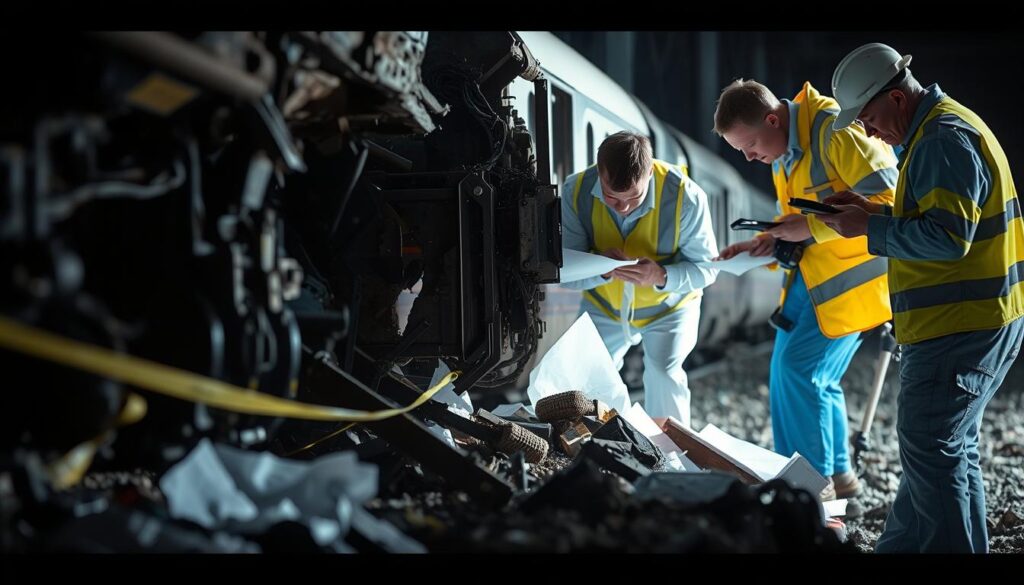Ever thought about needing a lawyer after a train accident? If you’ve been hurt or suffered damage from a train crash, knowing your rights is key.
These cases can be very complex. They often involve many parties, like rail companies and their insurance. This makes getting a lawyer very important.
Getting a railroad injury attorney can really help your case. They have the legal know-how to make sure you get the compensation you deserve.
Learn why trying to handle a train crash case by yourself might not be the best choice.
Train Accidents in the United States
It’s important to know about train accidents. They can happen in different ways, like derailments and collisions. Knowing this helps a lot in legal cases.
Common Types of Train Accidents
Train accidents can occur in many ways. Each type has its own reasons and effects. Here are some common ones:
- Derailments, where the train leaves the tracks
- Collisions with other trains or vehicles
- Accidents at railroad crossings
- Pedestrian accidents near train tracks
These accidents can be caused by many things. This includes mistakes by people, mechanical problems, or the environment.
Statistics on Train Accidents and Injuries
Train accidents lead to a lot of injuries and deaths. Looking at the numbers helps us understand how serious this is.
Some important stats are:
- The number of train accidents reported each year
- The rate of injuries and deaths in these accidents
- The most common causes of train accidents
Knowing these numbers is key. It shows how big of a problem train accidents are. It also highlights the need for legal help from experts.
The Aftermath of a Train Accident: What to Expect
If you’ve been in a train accident, knowing what comes next is key. Such events can deeply affect your health, finances, and happiness.
Immediate Medical Concerns
Getting medical help right after a train accident is vital. Even if you don’t feel hurt at first, some injuries might not show up right away. Getting checked out quickly can help catch and treat any problems early.
Financial Impact of Train Accidents
Train accidents can hit your wallet hard, with costs for medical care and lost work. The bills for treatment and the income you miss can add up fast. It’s important to understand these costs to plan your next steps.
Emotional and Psychological Effects
The emotional toll of train accidents is real. Victims often face trauma and stress that can change their lives. It’s crucial to recognize these effects to get the right support.
Getting help from a lawyer who specializes in train accidents can guide you. They can help you get compensation for your injuries and losses.
Different Types of Train Accident Victims
Train accident victims come from many backgrounds. If you or a loved one has been hurt, you might have legal options.
Passengers on Commuter and Amtrak Trains
Passengers have rights. If you got hurt on a commuter or Amtrak train, you could get money for your injuries and other costs.
Railroad Workers and FELA Claims
Railroad workers have special protection. If you’re a worker hurt on the job, you might get compensation for your injuries and expenses under FELA.
Pedestrians and Motorists at Crossings
People hit by trains at crossings also have legal rights. A train accident lawyer can help you get compensation for your injuries and damages.
- Seek medical attention immediately after the accident.
- Document the accident scene and your injuries.
- Consult with a train accident lawyer or railroad collision attorney to understand your rights.

Why Train Accident Cases Are Different from Other Personal Injury Claims
Train accidents have unique legal challenges. They are different from other personal injury cases. This is because they are heavily influenced by federal regulations and often involve multiple parties.
Federal Regulations and Railroad Law
Federal regulations are key in train accident cases. The rail industry is heavily regulated. Laws cover everything from train operation to maintenance standards.
The Federal Railroad Administration (FRA) sets strict guidelines. If a train accident happens because of a regulation violation, it can affect your case. A locomotive accident law firm can help understand these regulations and build a strong case for you.
Multiple Liable Parties in Train Accidents
Train accidents often have multiple parties that may be liable. This makes the legal process more complex. Potential defendants include the railroad company, train manufacturers, maintenance providers, and government entities.
Finding all liable parties is crucial for getting the most railroad injury compensation. An experienced attorney will thoroughly investigate the accident. They will find all potential sources of liability, ensuring you get the compensation you deserve.
Understanding these differences is key to navigating the legal landscape after a train accident. Recognizing the unique aspects of train accident cases helps prepare you for the legal journey ahead.
Reason #1: Train Accident Lawyers Understand Complex Railroad Regulations
After a train accident, you need more than just personal injury law knowledge. You need to understand complex railroad regulations. Train accident lawyers help victims know their rights and deal with legal complexities.
Federal Railroad Administration (FRA) Rules
The Federal Railroad Administration (FRA) makes rules for the railroad industry. These rules cover train operations, safety, and maintenance. Knowing these rules is key for legal help in train accident cases.
FRA rules set speed limits, braking standards, and crew training. These rules are important for figuring out who is at fault.
State-Specific Railroad Laws
State laws also play a role in train accidents, making cases more complex. Laws on crossing safety, noise, and liability can differ by state. A good train accident lawyer knows both federal and state laws.
How Regulatory Knowledge Strengthens Your Case
Knowing railroad rules can really help your case. It helps find who is at fault and what laws they broke. For example, if a safety standard was ignored, this could prove negligence.
Understanding state laws helps with local court procedures. It makes your case stronger.
Having a train accident lawyer with regulatory knowledge offers many benefits. They can:
- Find all parties who could be held responsible, like rail companies and maintenance providers.
- Know the legal duties of railroad operators and others involved.
- Use regulatory violations as proof of negligence to build a stronger case.
- Guide you through complex legal steps and ensure you follow the right laws.
Train accident lawyers use their knowledge of railroad rules to help victims get compensation. They understand FRA rules, state laws, and how to use this knowledge to strengthen your case. Experienced lawyers are crucial in handling train accident lawsuits.
Reason #2: Proper Evidence Collection and Preservation
Collecting and preserving evidence is key in train accident cases. The right evidence can make your claim strong. It’s important to know what evidence is crucial and how to keep it safe.
Critical Evidence in Train Accident Cases
Many types of evidence are important in train accidents. These include:
- Witness statements
- Physical evidence from the accident scene
- Train and railroad equipment inspection records
- Maintenance records of the train and tracks
- Photographs and videos of the accident scene
Getting this evidence quickly and knowing what’s important is crucial.

Time-Sensitive Nature of Railroad Evidence
Evidence in train accidents needs to be collected fast. Physical evidence can get lost or damaged over time. Witness memories also fade, making their statements less reliable.
| Evidence Type | Time Sensitivity |
|---|---|
| Physical Evidence | High – Can be lost or degraded |
| Witness Statements | High – Memories can fade |
| Train Inspection Records | Medium – Can be obtained later but may be more difficult |
| Photographic Evidence | Low – Can be taken immediately and preserved |
Expert Witnesses and Their Importance
Expert witnesses are crucial in train accident cases. They help prove who was at fault and the damages. Experts include:
- Engineers who analyze the accident cause
- Medical professionals who assess injuries
- Economists who calculate financial losses
Their testimony is key to a strong case and getting fair compensation.
Knowing how to collect and preserve evidence is vital after a train accident. Getting legal help is important. They ensure all important evidence is found and kept safe.
Reason #3: Accurate Valuation of Your Train Accident Claim
To get the right compensation after a train accident, you need to know your claim’s value. This involves looking at many factors that affect your case’s worth. A train accident lawyer can guide you through this complex process.
Calculating Current and Future Medical Expenses
Medical costs, both now and in the future, are key in train accident claims. Your lawyer will work with doctors to figure out the cost of treatment, rehab, and future surgeries. This includes:
- Emergency room visits and initial treatment
- Ongoing physical therapy and rehabilitation
- Prescription medications and medical equipment
- Potential future medical needs related to the accident
Lost Wages and Diminished Earning Capacity
Train accident victims may get compensation for lost wages and reduced earning power. This includes:
- Wages lost due to time off work for recovery
- Reduced earning potential if the injury impacts your ability to work
- Potential future lost earnings if your career is affected long-term
Your lawyer will document your lost income and future earning potential. This ensures you get fair compensation.
Pain and Suffering Compensation
Compensation for pain and suffering is a big part of train accident claims. This non-economic damage covers:
- Physical pain and discomfort
- Emotional distress and mental anguish
- Loss of enjoyment of life
Figuring out these damages needs experience and a deep understanding of your case. A skilled train accident lawyer can help you get fair compensation for these losses.
By accurately valuing your train accident claim, you can ensure you get the compensation you deserve. Getting advice from a railroad injury attorney or seeking train wreck legal advice can greatly improve your case’s outcome.
Reason #4: Navigating Insurance Company Tactics
After a train accident, you face more than just physical recovery. You also have to deal with insurance companies that want to lower your claim. It’s important to know their tactics to protect your rights.
Common Railroad Insurance Company Strategies
Insurance companies use certain strategies to lower their liability in train accidents. Some common tactics include:
- Quick settlement offers: They might offer a settlement early, hoping you’ll accept less than you deserve.
- Recorded statements: Adjusters may ask for recorded statements to use against you later.
- Blame shifting: They might try to blame you or others to reduce their liability.
These tactics can be tricky to handle on your own. A skilled train accident lawyer can help you understand and prepare for these strategies.
How Attorneys Counter These Tactics
Experienced attorneys can fight back against insurance company tactics, ensuring you get fair compensation. Here’s how:
- Negotiation expertise: Attorneys know how to negotiate for a fair settlement that covers all your damages.
- Evidence collection: Lawyers collect and preserve important evidence, building a strong case against insurance company scrutiny.
- Understanding of policy details: Attorneys know the details of railroad insurance policies, helping you navigate your claim.
By hiring a railroad collision attorney, you get more than just legal help. You get a strategic partner to fight for the compensation you deserve in the complex insurance world.
Reason #5: Litigation Experience and Trial Preparation
In the complex world of train accident law, having an attorney with trial experience is key. You need a lawyer who knows railroad law inside out. They should also be skilled in courtroom battles.
When Settlement Isn’t Possible
At times, settling isn’t an option, and going to court is the only way. This is where a top-notch locomotive accident law firm shines. Lawyers with lots of trial experience can tackle the tough parts of a trial.
They know how to build a strong case. They’re experts at gathering and presenting evidence. And they can argue well in front of judges and juries.
- They know how to navigate complex legal procedures.
- They are skilled in presenting evidence and expert testimonies.
- They have experience in handling high-stakes negotiations and trials.
The Value of Courtroom Experience
Lawyers with courtroom experience can greatly improve your case’s outcome. They’re familiar with trial procedures and can handle the courtroom’s dynamics well. By choosing a lawyer with a strong litigation record, you boost your chances of getting fair compensation.

When picking a train accident lawyer, look at their trial experience and preparation. This ensures you have a strong advocate ready to fight for you in court if needed.
How to Find the Right Train Accident Lawyer for Your Case
If you’ve been hurt in a train accident, finding the right lawyer is key. You need someone who knows train accident law well. They should also have the experience and skills to handle your case.
Essential Qualifications to Look For
When choosing a lawyer for your train accident case, look for certain qualifications. Find a lawyer with a strong track record in train accident cases. Their experience shows they know the laws and regulations well.
Also, check their reputation and what past clients say. It’s important they can explain things clearly to you.
| Qualification | Description | Importance |
|---|---|---|
| Experience in Train Accident Law | Proven track record in handling train accident cases | High |
| Reputation and Client Reviews | Positive feedback from previous clients | Medium |
| Communication Skills | Ability to clearly explain legal processes and updates | High |
Questions to Ask During Your Consultation
During your first meeting, ask important questions. Ask about their experience with cases like yours. Find out how they plan to handle your case and how they’ll keep you updated.
Also, ask about their fees and how they handle case expenses. This will help you understand their approach and costs.
- What experience do you have with train accident cases?
- How will you approach my case, and what strategies will you employ?
- How will you keep me informed about the progress of my case?
The Train Accident Claim Process: Step-by-Step Guide
The train accident claim process has several important steps. It starts with an initial investigation and can lead to litigation. Knowing these steps helps you understand how to seek compensation after a train accident.
Initial Investigation and Case Building
The first step is crucial. It involves collecting evidence, talking to witnesses, and looking into the accident’s details. A good investigation helps prove who was at fault and supports your claim.
Negotiation Phase
Next, you’ll negotiate with insurance companies or those responsible. Your lawyer will aim for a settlement that covers your costs. This includes medical bills, lost wages, and pain and suffering.
Litigation and Trial Procedures
If a settlement can’t be reached, you might go to court. Here, your case is presented to a judge or jury. Having a skilled train accident lawyer is key in this stage.
| Step | Description | Key Elements |
|---|---|---|
| Initial Investigation | Gathering evidence and building the case | Evidence collection, witness statements |
| Negotiation | Reaching a settlement with liable parties | Insurance companies, settlement agreements |
| Litigation | Pursuing compensation through court proceedings | Court appearances, legal representation |
Common Types of Compensation in Train Accident Cases
If you’ve been in a train accident, knowing what compensation you can get is key. Victims often face big medical bills, lost income, and other financial hits.
Economic Damages You Can Recover
Economic damages help cover your financial losses. These include:
- Medical expenses related to your injury
- Lost wages due to your inability to work
- Future medical expenses if your injury requires ongoing treatment
- Diminished earning capacity if your injury affects your ability to work in the future
| Type of Economic Damage | Description | Example |
|---|---|---|
| Medical Expenses | Costs associated with treating your injuries | Hospital bills, doctor fees, medication |
| Lost Wages | Income you would have earned if not for the accident | Salary, bonuses, benefits |
Non-Economic Damages and Their Value
Non-economic damages cover non-monetary losses like pain and suffering. These damages are harder to measure but can be very important.
When figuring out non-economic damages, courts look at how bad your injuries are. They also consider how much your daily life has changed and the long-term effects of the accident.
Statute of Limitations: Why Time Is Critical After a Train Accident
If you’ve been in a train accident, knowing the statute of limitations is key. This legal deadline to file a lawsuit varies by state. It’s important for your claim.
State-by-State Variation in Filing Deadlines
The time to file a claim after a train accident can vary. It depends on where you are and the type of claim. For example, some states give you two years for personal injury claims. Others have different rules for wrongful death or property damage.
| State | Statute of Limitations for Personal Injury | Statute of Limitations for Wrongful Death |
|---|---|---|
| California | 2 years | 2 years |
| New York | 3 years | 2 years |
| Texas | 2 years | 2 years |
Exceptions to Standard Deadlines
While the statute of limitations sets a general rule, there are exceptions. For claims against the government, the deadline can be as short as six months. The discovery rule also applies if the injury wasn’t clear right away.
It’s important to understand these exceptions to file on time. Talking to a railroad collision attorney can help. They can guide you through the process and protect your rights.
Real-Life Success Stories: How Train Accident Lawyers Made a Difference
Train accident lawyers have changed lives in many ways. Their work is shown through the success stories of those they’ve helped. These stories highlight the big difference these lawyers make in their clients’ lives.
Case Study #1: Passenger Injury Settlement
A passenger on an Amtrak train was badly hurt when it derailed. The person had many broken bones and needed a lot of medical care. Thanks to a skilled train accident lawyer, the passenger got a big settlement.
This settlement covered medical bills, lost wages, and pain and suffering. The lawyer’s knowledge of railroad laws and insurance was key to getting this result.
Case Study #2: Railroad Worker Compensation
A railroad worker got hurt on the job because of his employer’s mistake. The injury was so bad that the worker couldn’t go back to work. A smart railroad injury lawyer helped the worker.
The lawyer filed a claim under the Federal Employers Liability Act (FELA). They got a deal that covered the worker’s future medical and financial needs.
These stories show how important it is to have a good lawyer in train accident cases. Whether you’re a passenger or a railroad worker, a skilled lawyer can really help your case.
Conclusion: Protecting Your Rights After a Train Accident
If you’ve been in a train accident, you need a lawyer’s help. A skilled Train Accident Lawyer can guide you through the process. They will help you get the most compensation for your injuries and losses.
Train accidents can cause serious injuries and big financial losses. Without a lawyer, getting fair compensation can be tough. A Train Accident Lawyer knows railroad law well and can talk to insurance companies for you.
Don’t settle for less than you deserve. Get help from a qualified Train Accident Lawyer today. They will make a big difference in your case.
Frequently Asked Questions
What actions should I take immediately following a train accident?
Primarily, ensure your safety. Subsequently, seek immediate medical assistance. Subsequently, capture images of the scene and engage with witnesses. Notify the authorities of the incident.
Consulting a train accident attorney is also prudent. They can assist you in comprehending your rights and alternatives.
How can I determine if I require the services of a train accident attorney?
If you sustained injuries in a train accident or experienced the loss of a loved one, it is advisable to consult with an attorney. They can assist you in navigating the legal procedures. They will ensure you receive equitable reimbursement and manage interactions with insurance companies on your behalf.
What kind of compensation am I entitled to in a rail accident case?
You may receive compensation for medical expenses, lost income, and burial expenses. Compensation may also be obtained for pain, suffering, and mental anguish. An attorney can ascertain the potential compensation you may receive.
What is the time limit for filing a lawsuit about a rail accident?
The statute of limitations for filing a lawsuit differs by jurisdiction. Typically, the duration ranges from one to three years. It is imperative to see a lawyer promptly to avoid missing the deadline.
Am I still eligible to file a claim if I bear partial responsibility for the train accident?
Indeed, you may still submit a claim even if you bear partial responsibility. An attorney can elucidate how the statutes of your state may impact your situation. They can assist you in comprehending the potential amount you may receive.
What is the function of the Federal Railroad Administration (FRA) in rail accidents?
The FRA establishes and enforces safety regulations for trains. A collision resulting from a violation of a FRA regulation could bolster your case. An adept attorney will possess knowledge of FRA regulations and their applicability to your circumstances.
What criteria should I consider when selecting an appropriate train accident attorney for my case?
Seek an attorney with extensive experience in train accident litigation. They must possess a commendable track record and demonstrate a thorough understanding of railroad law. Inquire about their methodology, price structure, and the means by which they will provide updates during your case.

